- Home
- Jay Bonansinga
The Sleep Police Page 9
The Sleep Police Read online
Page 9
But the worst part was just before Frank passed out: The feeling smoldering deep down inside him, a tiny glowing ember of hope that he was innocent...
...a tiny glowing ember that was slowly but surely being extinguished.
CHAPTER FOURTEEN
A dog barking.
Eyes fluttering open, the cool grit of old linoleum pressed against Frank’s cheek.
Frank tried to move, but he found his body as brittle and immovable as deadwood, and when he tried to tilt his head to get a better look at his surroundings, the light seemed to close in around him, the shadowy tunnel ahead of him shifting and stretching away like a spyglass turning inside out. He could smell the oily, black odors of resins and burning rubber. Spanish Vato music played through cheap speakers somewhere.
He managed to sit up, his head spinning, sudden pain shearing along his spine. His stomach was scoured empty, and there was dried vomit along the front of his denim shirt. He looked around and realized he was in the filthy back hallway of a greasy little body shop somewhere in the city. He could hear the whine of power drills behind him, rowdy voices speaking in Spanish, metallic hammering noises. Yellowed Playboy calendars hung on the walls above him, and sunlight slanted in from an open garage doorway about twenty feet away.
Frank looked down at his watch. It was almost noon. How long had he been out?
He turned toward the open doorway, the glare of sunlight making him blink. He rubbed his eyes and tried to focus on the outside. Through the doorway he could see another innocuous alley, the pavement stained with grease, the far wall emblazoned with graffiti. Somebody had written “SUCK MY COCK” in orange Rust-Oleum spray paint, and a page of newsprint was tumbling by on a noxious breeze.
There was an object resting on the cement near the open doorway.
Frank’s heart began to flutter as he gaped at the object. His muscles were seizing up all of a sudden, his mouth fast-drying. The object was obviously meant for him. A special delivery from a ghost. He managed to rise to his feet. He barely noticed his joints screaming with pain, or the dizziness washing over him, or the fact that his skull felt as though it had been bashed in with a baseball bat.
He was too fixated on the tiny package sitting on the pavement near the door.
He walked over to it, knelt down and picked it up. It weighed about the same as the other unmarked package, and when Frank shook it, the sound of grommets rattled loosely. It was most certainly another videotape. But this time, there was an additional layer of cruelty. An extra element of sick humor that was turning Frank’s stomach.
The thing was all wrapped up like a birthday present, with pastel confetti paper and a neat little pink bow.
The sun was hot and angry on the back of Sully Deets’s neck as he trudged up a flight of stone steps leading up to the threshold of Frank Janus’s apartment building. All around Deets, the Chippewa Park neighborhood was bustling with activity. The air smelled of tar and exhaust, and the sound of a distant jackhammer grated on Deets’s nerves.
The sad fact was Deets was about to do something that he never dreamed in a million years he would have to do as a homicide detective. Sure, he had been in the shit now and again over the years. He had seen domestics that would make Night of the Living Dead seem like a Disney movie. And one time he had even been forced to fish a severed head out of the Chicago River with a bamboo pole. He had seen everything. But he had never ever expected to question his own partner in a series of gruesome serial murders.
He reached the front porch and paused, pulling out a hankie to wipe his neck.
Just a few minutes ago, Deets had gotten word from the Cook County Coroner that they had finally identified the second Jane Doe from Little Pakistan by running the corpse’s fingerprints through the National Automated Fingerprint Identification System. She was Sandra Louise Dreighton, thirty-three years old, formerly residing at the Heart of Chicago transient hotel. Also known as a Jennifer Juggs, she was a former house dancer down at the Treasure Chest on Wells Street. She had been in and out of the Gateway Treatment Center three times over the last decade for cocaine addiction, and she had a five-year-old daughter currently residing in a foster home. Maybe poor Sandra Louise had been trying to clean her life up at the time of her death. Maybe not. Deets would never know.
Deets stared at the row of metal mailboxes. Frank’s was the last one. Deets paused, gazing at the doorbell button below it. A fly buzzed and ticked nervously against the transom over the door.
They didn’t pay Deets enough to deal with shit like this, especially since he had only been given three merit raises in over twenty years on the job—first as a uniform, then in property crimes, and then in homicide. And now this. A mere three years away from his pension, standing in the heat outside Frank Janus’s place, sick to his stomach, about to give the third degree to the best partner he ever had.
Over the course of his tenure with the CPD, Sully Deets had seen all types, from the good to the bad to the plug-ugly. On more than one occasion, Deets had heard of cops going off the track and turning violent. But Frank Janus was unlike any other cop Deets had ever encountered. Frank Janus was gold. Frank Janus was a mensch. Sure, he was a little delicate, a little edgy, but God damn it, there was nobody Deets would rather have watching his back.
Unfortunately, Deets could no longer ignore the hunch that had been twisting around in his gut for days. It had started with the strange behavior Frank had exhibited at the scenes. And it had grown as the evidence mounted. The heel imprint from a high-fashion loafer that matched Frank’s, the hair follicle that matched a hair taken off Frank’s desk, the fragment of a Marlboro cigarette that Deets had finally connected to Frank’s own brand, and the series of fibers found under Sandra Louise Dreighton’s fake nails that matched fibers from Frank’s locker. And then there was the weird incident with the bomb squad, and whatever was on that videotape. And finally, the realization that all three thumb suckers had resided within a three-mile radius of Frank’s apartment.
Deets had run out of options.
He sighed, and he was reaching for the door buzzer—in fact, his hand was literally poised in the air over the button—when a shrill sound suddenly chirped from his pocket.
His beeper.
Deets dug the device out of his pocket and looked at the display. It was a dispatch number with the 187 suffix at the end. There had been another murder somewhere in Deets’s sector, and Deets was needed.
Relieved, Deets turned and hurried back down the stone steps.
Saved by the bell.
Frank took a CTA bus north along the lake shore with the birthday gift tucked under his arm, his mind writhing with panic. He felt the stares of other passengers. He looked atrocious, wrinkled and pale and sick.
He made it back to Wilmette by 1:00 pm, and he found the Honda in a tow-lot near the north edge of the Northwestern University campus. He flashed his shield at the cashier, and he got his car back without much of a problem.
He headed straight home, the birthday gift burning a hole on the passenger side.
When he arrived back at his apartment, he didn’t even bother to change out of his clothes or go to the bathroom. He went immediately into his living room and switched on his VCR and TV. He looked down at the birthday gift clutched in his hands, and noticed something was wrong. It felt wet. He looked at his hand and saw blood.
He dropped the gift.
His palm was smeared with blood. Deep, scarlet blood, as thick and shiny as thirty-weight oil.
Dizziness yanked at him, threatened to knock him off his feet. His knees wobbled. He brought his hand up to his nose and smelled the unmistakable coppery aroma. He rubbed his fingers together and felt the silky texture of the blood. His guts were as tight as a noose, his bowels burning. He looked down the floor and saw the birthday gift.
Tiny droplets of blood had spattered the carpet where he had dropped the gift.
“Christ,” Frank uttered with horror. “Christ—Christ—”
&nbs
p; He managed to reach down and grab the gift off the floor. Then he stumbled into the kitchen, ran water in the sink, rinsed his hands and wiped the package with a paper towel. A dab of blood was beaded on the end of the faucet, a few drops in the seams and cracks of the counters. Frank madly wiped it away, mind in a frenzy.
Whose blood was it? Frank’s cop-instinct was sending up warning alarms through his brain. There was blood all over his apartment now. Somebody’s DNA was in the cracks of his kitchen counters, spotting the Persian rug in his living room. Now Frank was having a hard time drawing a breath, his chest squeezing tighter and tighter. It felt as though his heart was about to explode.
He opened the birthday present with wet, trembling hands.
He stood there for a long moment, frozen in terror as he stared at the contents of the package.
There were two items. One of them was another unmarked videotape, another malignant shell of plastic just waiting to infect Frank’s life with more poison. And the other item—the source of the blood—was wrapped in a thin membrane of sodden Kleenex.
Frank carefully opened the Kleenex and gazed down at the grotesquely flattened object.
It was the severed remains of a human ear, with a row of delicate little silver rings pierced through it.
CHAPTER FIFTEEN
The whir of the videotape, the hollow click of the playback heads...
Standing in front of the TV, absolute horror constricting his throat, flooding his eyes, squashing his heart, Frank felt his entire world contracting into a tight black tunnel around that cathode ray tube in front of him. The flicker of blue light filling the tunnel for a moment, a series of electronic spurts and crackles coalescing into an image...
(A shaky, hand-held view of an empty apartment, the camera moving through familiar rooms, glimpses of scarred hardwood floors, and walls spattered and smeared with blood. The image bounces and jags toward the bathroom, as though the camera operator is merrily walking through this deadly still apartment. The sound of breathing can be heard.)
A single tear began to track down Frank’s cheek as he gaped at the terrible video. He was shaking now. He knew what was coming next.
(The camera enters the modest little bathroom, shakily panning across a porcelain sink to a claw-foot bathtub in the corner. A black plastic curtain is drawn. Blood droplets stipple the tub and the walls behind it.)
Frank recognized the bathroom. The magazine rack filled with literary quarterlies. The toiletries lined up along the back of the toilet.
Clenching his fists so tightly his fingernails began to dig into the flesh of his palms, Frank didn’t want to see what was coming next, and yet he could not tear his eyes away.
(The camera settles on the commode, and then a figure steps in front of the lens: It’s Frank. The Bad Frank. The Angry Frank. Dressed in a painter’s coverall splattered with congealed blood, he stares into the lens, breathing hard. He looks like a man trying to control his raging temper. His eyes are rimmed in red, as though he’s been crying. He takes a deep breath, then says, “You fucking prick, you had to watch that videotape. You had to stick your nose where it doesn’t belong—”)
Frank watched in horror, his knuckles turning white from the pressure of his fists.
(The on-screen Frank twitches with anger and says, “You want to see what happens when certain cops refuse to mind their own business and stop being so nosy?” Then he reaches behind himself, and he shoves the shower curtain aside, revealing the surprise guest lying in the tub.)
“Ah-Jesus-no,” Frank moaned in agony, his body seizing up at the sight of his brother.
(The camera holding for one excruciatingly long moment on the dead body.)
Frank slammed his eyes closed, the terror and revulsion erupting in him.
It was impossible, it couldn’t be, it just couldn’t be, not like this...
Then Frank managed to look back up at the screen, the abomination screaming at him, and the image of his own face leering back at him like an obscene gibbous moon. It was too much for him. He tried to scream something at the screen, but his voice got tangled up in his throat. And finally all the bile and horror rose up in him, and he lurched forward, collapsing to his knees.
And he roared vomit all over the rug.
(On screen, Frank’s brother Kyle is lying stone dead in the tub, curled into a fetal position, his thumb in his mouth, the side of his face a bloody pulp.)
Frank heaved the rest of his guts out, then managed to wipe his face.
On screen, the Video-Frank was saying something else into the camera lens— something clever and cruel—but Frank could hear nothing now but the rushing jet-engine sounds in his ears. Perhaps it was the sound of his own sanity swirling down the drain.
“WHY?!”
Frank lashed out at the TV, shoving it with all his might backwards off the shelf.
The monitor bounced off the back wall, then tumbled forward to the floor. The tube shattered on impact, making a horrendous cracking noise, followed by a fizzing high voltage pop that seemed to envelope the TV for a moment. Frank cried out in garbled, inarticulate rage, as a thick metallic odor of burning circuits filled the room.
Sobbing, choking on his own rage, Frank lunged at the VCR. He tore the videotape out of the deck, then rended it to pieces with his bare hands.
“WHY?!”
He hurled the pieces to the floor and stomped on them.
Then he collapsed again.
Face buried in his hands, body convulsing, Frank sobbed uncontrollably on the bloodstained Persian rug for several moments. He kept repeating Kyle’s nickname—Boomer-Boomer-Boomer—and then—I’m so sorry, I’m so sorry, I’m so sorry, Boomer—and the horror and revulsion was pressing down on Frank like a gigantic invisible hand of an angry god, and he sank to the floor.
Darkness closed in around him, along with the vile tide of self-loathing. He could hardly breathe, the shock was so overwhelming.
And he lay there like that for several moments.
Until he heard the sounds.
A pair of sedans skudding to a halt, almost simultaneously, against the curb outside the Chippewa Park building—an unmarked Crown Victoria and a black-and-white beat car, radios crackling. A big man wearing a cheap rayon sport coat, his sidearm bulging beneath the hem, emerged from the Ford. Two uniformed cops emerged from the black-and-white.
“I’ll take care of the formalities,” Sully Deets said to the uniforms. “You two just stay in the background, back me up if you have to.”
Deets started up the stone steps.
The uniforms followed him, unsnapping the safety straps of their .357 service revolvers as they came. They had to hustle to keep up with the big man, who was striding up the steps two at a time, his big fleshy face all grim and set. The younger of the two uniforms—a kid named Foley, only eighteen months out of the academy—sensed something major was going on. Not only were they about to put the collar on one of their own—a decorated detective yet—but their honcho, Deets, was real conflicted about the whole thing. Something was very wrong with this picture, and it was making Foley nervous.
A dispatcher’s voice suddenly sizzled out of Foley’s hip radio.
Deets shot the kid a glance on his way up the steps. “This is my partner we’re dealing with here, not some skell. I don’t want anybody hard-nosing, or anybody flashing any iron. You got that?”
Foley and his partner nodded.
Deets reached the top of the stairs, pausing to fish in his pocket for a skeleton key. “I’ll do the talking,” he said, glancing back at the other two.
As if there was any question as to who would be doing the talking.
Prostrate on the floor, engulfed in a haze of grief and shock, Frank could hear the crackle of a police radio outside, nearby, and the sound of it did something to Frank.
He sat up, his ears ringing, his whole body feeling galvanized, as though it had suddenly undergone a transformation from one element to another. He stood up, the image of
his brother dying like an animal vibrating in his head. Frank shuddered, his eyes pressing shut, trying to will the image out of his brain. “I’m so sorry, Boomer,” he uttered under his breath.
The police radio was getting closer. It was in his building now, downstairs, in the front foyer. And all at once a series of realizations were streaming through Frank’s mind: The Thumb Sucker Killer was inside him, a parasite who had killed his own brother, a monster, a sideshow attraction, and Deets was too smart a cop not to figure it out, and now Frank’s life was over, it was over, and there was really only one last opportunity to take responsibility for his sickness.
One last chance.
Outside his door, in the hallway: footsteps, the sizzle of a dispatcher’s voice.
Frank rushed over to the closet, threw open the door and tossed aside the hanging coats and plastic-wrapped dry cleaning. He found the shotgun clipped to plastic brackets against the back wall. It was a Remington Model 870 from Frank’s patrol days, a cut-down version with a nine-inch barrel, a seven-round magazine and a pistol grip—the same kind of weapon carried by the presidential protection detail of the Secret Service. Frank tore it off the brackets.
The shotgun was mostly for home defense nowadays, especially since the mere sound of the pump-action slide was enough to scare off any burglars. But right now Frank needed it for insurance. Insurance that he would be given a chance to do the right thing. That’s all he wanted.
One chance.
There was a knock on the front door—loud and fast—and then a voice.
“Bambi?”
Frank’s spine straightened. It was amazing how fast his world was coming unraveled.
He went over to the door, gripping the shotgun tightly, wiping the tears and snot off his face onto his shoulder. He tried to talk. “That you, D?”

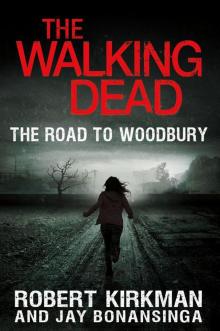 The Walking Dead: The Road to Woodbury
The Walking Dead: The Road to Woodbury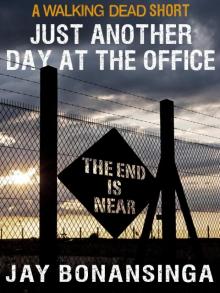 Just Another Day at the Office
Just Another Day at the Office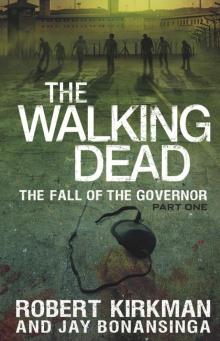 The Fall of the Governor: Part One
The Fall of the Governor: Part One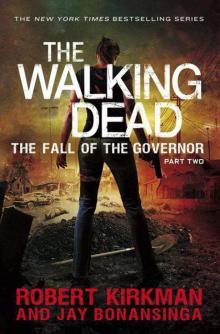 The Walking Dead: The Fall of the Governor: Part Two
The Walking Dead: The Fall of the Governor: Part Two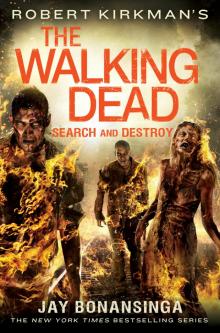 Search and Destroy
Search and Destroy Invasion
Invasion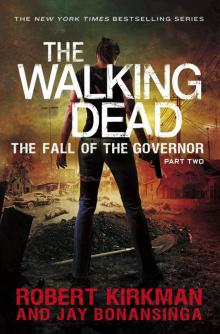 The Fall of the Governor: Part Two
The Fall of the Governor: Part Two The Walking Dead Collection
The Walking Dead Collection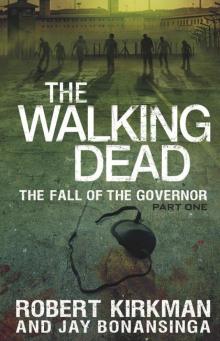 The Walking Dead
The Walking Dead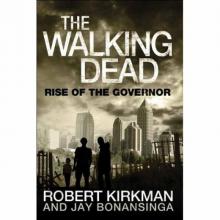 Descent
Descent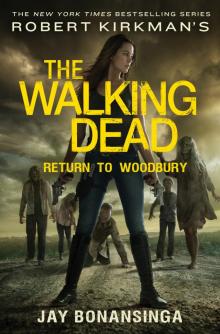 The Walking Dead: Return to Woodbury
The Walking Dead: Return to Woodbury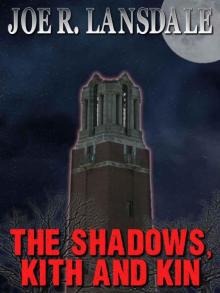 The Killer's Game
The Killer's Game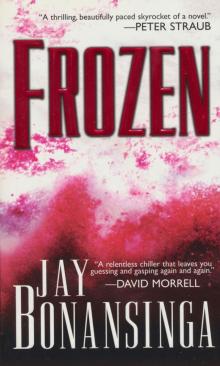 Frozen
Frozen Shattered
Shattered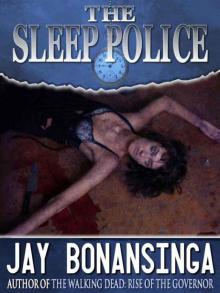 The Sleep Police
The Sleep Police Perfect Victim
Perfect Victim